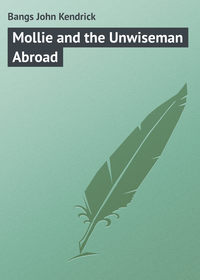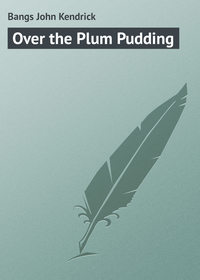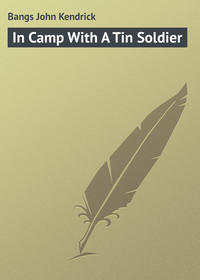
"Hullo, Jimmieboy!" said one of the larger rockets, taking off his funny little cap at the astonished youngster. "I suppose you've come down to see us rehearse?"
"I thought somebody was stealing you, and I came down to frighten them away," Jimmieboy replied.
The Rocket laughed. "Nobody can steal us," it said. "If anybody came to steal us, we'd cry, and get so soaked with tears nobody could get us to go off, so what good would we be?"
"Not much, I guess," said Jimmieboy.
"That's the answer," returned the Rocket. "You seem to be good at riddles. Let me give you another. What's the difference between a man who steals a whole wig and a fire-cracker?"
"I am sure I don't know," said Jimmieboy, still too full of wonderment to think out an answer to a riddle like that.
"Why, one goes off with a whole head of hair," said the Rocket, "and the other goes off only with a bang."
"That's good," said Jimmieboy. "Make it up yourself?"
"No," said the Rocket. "I got that out of the magazine."
"What magazine?" asked Jimmieboy, innocently.
"The powder-magazine," roared the Rocket, and then the Pin Wheel and other fire-works danced about, and threw themselves on the floor with laughter – all except the Torpedoes, which jumped up and down on a soft plush chair, where they were safe.
When the laughter over the Rocket's wit had subsided, one of the Roman Candles called to the Giant Cracker, and asked him to sing a song for Jimmieboy.
"I can't sing to-night," said the Cracker. "I'm very busy making ready my report for to-morrow."
Here the Cracker winked at Jimmieboy, as much as to say, "How is that for a joke?" Whereat Jimmieboy winked back to show that he thought it wasn't bad; which so pleased the Cracker that he said he guessed, after all, he would sing his song if the little Crackers would stop playing until he got through. The little Crackers promised, and the Giant Cracker sang this song:
"THE GIANT CRACKER AND THE MANDARIN'S DAUGHTER"He was a Giant Cracker bold,His name was Wing-Hi-Ee.He wore a dress of red and gold —Was handsome as could be.His master was a Mandarin,Who lived in old Shang-Hai,And had a daughter named Ah Din,With sweet blue almond eye."Now Wing he loved this Saffron Queen,And Ah Din she loved him;But Chinese law came in betweenThem with its measures grim.For you must know, in that far land,Where dwell the heathen wild,A Cracker may not win the handOf any noble's child."This made their love a hopeless one —Alas! that it should beThat anywhere beneath the sunExists such misery!So they resolved, since she could notBecome his cherished bride,Together they'd seek out some spotAnd there they'd suicide."They hastened, weeping, from the town,Wing-Hi and fair Ah Din,And on the river-bank sat downUntil the tide came in.Then Wing-Hi whispered, sitting there,With tear-drops in his eye,'Good-by, Ah Din!' And, in despair,She answered him, 'Good-by.'"And then she grasped a sulphur match;She lit it on her shoe,Whereat, with neatness and dispatch,Wing-Hi she touched it to.There came a flash, there came a shriek,A sound surpassing weird,And Wing-Hi brave and Ah Din meekIn pieces disappeared.""Isn't that lovely?" asked the Rocket, his voice husky with emotion.
"It's very fine," said Jimmieboy. "It's rather sad, though."
"Yes; but it might have been sadder, you know," said the Giant Cracker. "She might not have loved him at all; and if she hadn't loved him, he wouldn't have wasted a match committing suicide for her sake, and then there wouldn't have been any tragedy, and, of course, no song would have been written about it. Why, there is no end to the misery there might have been."
Here one of the Torpedoes fell off the gas-fixture to the floor, where he exploded with a loud noise. There was a rush from all sides to see whether the poor little fellow was done for forever.
"Send for the doctor," said the Pin Wheel. "I think he can be mended."
"No, don't," said the injured Torpedo. "I can fix myself up again. Send for a whisk broom and bring me a parlor match, and I'll be all right."
"What's the whisk broom for?" asked Jimmieboy, somewhat surprised at the remedies suggested.
"Why," said the Torpedo, "if you will sweep me together with the whisk broom and wrap me up carefully, I'll eat the head off the parlor match, and I'll be all right again. The match head will give me all the snap I need, and if you'll wrap me up in the proper way, I'll show you what noise is to-morrow. You'll think I'm some relation to that Miss Din in the Giant Cracker's song, unless I'm mistaken, when you hear me explode."
The Fire-crackers jeered a little at this, because there has always been more or less jealousy between the Torpedoes and the Fire-crackers, but the Rocket soon put a stop to their sneers.
"What's the use of jeering?" he said. "You don't know whether he'll make much noise or not. The chances are he'll make more noise than a great many of you Crackers, who are just as likely as not to turn out sissers in the long-run."
The Fire crackers were very much abashed by the Rocket's rebuke, and retired shamefacedly into their various packs, whereupon the Pin Wheel suggested that the Rocket recite his poem telling the singular story of Nate and the Rocket.
"Would you like to hear that story, Jimmieboy?" asked the Rocket.
"Very much," said Jimmieboy. "The name of it sounds interesting."
"Well, I'll try to tell it. It's pretty long, and your ears are short; but we can try it, as the boy observed to the man who said he didn't think the boy's mouth was large enough to hold four pieces of strawberry short-cake. So here goes. The real title of the poem is
"THE DREADFUL FATE OF NAUGHTY NATE"Way back in eighty-two or three —I don't recall the date —There lived somewhere – 'twixt you and me,I really can't locateThe place exact; say Sangaree —A lad; we'll call him Nate."His father was a grocer, orA banker, or maybeHe kept a thriving candy store,For all that's known to me.Perhaps he was the GovernorOf Maine or Floridee."At any rate, he had a dad —Or so the story's told;Most youngsters that I've known have had —And Nate's had stacks of gold,And those who knew him used to add,He spent it free and bold."If Nate should ask his father forA dollar or a cent,His father'd always give him moreThan for to get he went;And then, before the day was o'er,Nate always had it spent."Molasses taffy, circus, cake,Tarts, soda-water, pie,Hot butter-scotch, or rare beefsteak,Or silk hats, Nate could buy.His father'd never at him shakeHis head and ask him 'Why?'"'For but one thing,' his father cried,'You must not spend your store;Sky-rockets I cannot abide,So buy them never more.Let such, I pray, be never spiedInside of my front door.'"But Nate, alas! did not obeyHis father's orders wise.He hied him forth without delay,Ignoring tarts and pies,And bought a rocket huge, size A,'The Monarch of the Skies.'"He clasped it tightly to his breast,And smiled a smile of glee;And as the sun sank in the west,He sat beneath a tree,And then the rocket he invest-I-g-a-t-e-d."Alas for Nate! The night was warm;June-bugs and great fire-fliesAround about his head did swarm;The mercury did rise;And then a fine electric stormPlayed havoc in the skies."Now if, perchance, it was a fly,I'm not prepared to say;Or if 'twas lightning from the sky,That came along that way;Or if 'twas only brought on byThe heat of that warm day,"I am not certain, but 'tis clearThere came a sudden boom,And high up in the atmosphere,Enlightening the gloom,The rocket flew, a fiery spear,And Nate, too, I presume."For never since that July dayHas any man seen Nate.But far off in the Milky Way,Astronomers do state,A comet brilliant, so they say,Doth round about gyrate."It's head's so like small Natty's face,They think it's surely he,Aboard that rocket-stick in space,Still mounting constantly;And still must mount until no traceOf it at all we see.""Isn't that the most fearfully awfully terribly horribly horribly terribly fearful bit of awfulness you ever heard?" queried the Rocket, when he had finished.
"It is indeed," said Jimmieboy. "It really makes me feel unhappy, and I wish you hadn't told it to me."
"I would not bother about it," said the Rocket; "because really the best thing about it is that it never happened."
"Suppose it did happen," said Jimmieboy, after thinking it over for a minute or two. "Would Nate ever get back home again?"
"Oh, he might," returned the Rocket. "But not before six or seven million years, and that would make him late for tea, you know. By-the-way," the Rocket added, "do you know the best kind of tea to have on Fourth of July?"
"No," said Jimmieboy. "What?"
"R-o-c-k-e-tea," said the Rocket.
The Pin Wheels laughed so heartily at this that one of them fell over on a box of Blue Lights and set them off, and the Rocket endeavoring to put them out was set going himself, and the first thing Jimmieboy knew, his friend gave a fearful siss, and disappeared up the chimney. The sparks from the Rocket falling on the Roman Candles started them along, and three or four balls from them landed on a flower piece which was soon putting forth the most beautiful fiery roses imaginable, one of which, as it gave its dying sputter, flew up and landed on the fuse of a great set piece that was supposed to have a motto on it. Jimmieboy was almost too frightened to move, so he just sat where he was, and stared at the set piece until he could read the motto, which was, strange to say, no motto at all, but simply these words in red, white, and blue fire, "Wake up, and go to bed right." Whereupon Jimmieboy rubbed his eyes, and opened them wider than ever to find his papa bending over him, and saying the very words he had seen on the set piece.
Probably the reason why his papa was saying this was that Jimmieboy had been found by him on his return home lying fast asleep, snuggled up in the corner of the library lounge.
As for the fire-works, in some way or other they all managed to get back into the box again in good condition, except the broken torpedo, which was found in the middle of the floor just where it had fallen. Which Jimmieboy thinks was very singular.
X.
JIMMIEBOY'S PHOTOGRAPH
Jimmieboy had been taken to the photographer's and had posed several times for the man who made pictures of little boys. One picture showed how he looked leaning against a picket fence with a tiger skin rug under his feet. Another showed him in the act of putting his hands into his pockets, while a third was a miserable attempt to show how he looked when he couldn't stand still. The last pleased Jimmieboy very much. It made him laugh and Jimmieboy liked laughing better than anything, perhaps, excepting custard, which was his idea of real solid bliss. Why it made him laugh, I do not know, unless it was because in the picture he was very much blurred and looked something like a mixture of a cloud and a pin-wheel.
"I like that one," Jimmieboy said to his mother, when the proof came home. "Won't you let me have it?"
"Yes," said his mother. "You can have it. I don't think any one else wants it."
So the proof became Jimmieboy's property, and he put it away in his collection of treasures, which already contained many valuable things, such as the whistle of a rubber ball, a piece of elastic, and a worn-out tennis racket. These treasures the boy used to have out two or three times a day, and the last time he had them out something queer happened. The blurred little figure in the picture spoke to him and told him something he didn't forget in a hurry.
"You think I'm a funny-looking thing don't you?" said the blurred picture of himself.
"Yes, I do," said Jimmieboy, "that's why I laugh at you whenever I see you."
"Well, I laugh when I see you, too," retorted the picture. "You are just as funny to look at sometimes as I am."
"I'm not either," said Jimmieboy. "I don't look like a cloud or a pin-wheel, and you do."
"I'm a picture of you, just the same," returned the proof, "and if you had stood still when the man was taking you, I'd have been all right. It's awful mean the way little boys have of not standing still when they are having their pictures taken, and then laughing at the thing they're responsible for afterward."
"I didn't mean to be mean," said Jimmieboy.
"Perhaps not," retorted the picture, "but if it hadn't been for you I'd have been a lovely picture, and your mamma would have had a nice little silver frame put around me, and maybe I'd have been standing on your papa's desk with the inkstand and the mucilage instead of having to live all my life with a broken whistle and a tennis bat that nobody but you has any use for."
Here the picture sighed, and Jimmieboy felt very sorry for it.
"Boys don't know what a terrible lot of horrid things happen because they don't stand still sometimes," continued the picture. "I know of lots of cases where untold misery has come from movey boys."
"From what?" queried Jimmieboy.
"Movey boys," replied the picture. "By that I mean boys that don't stand still when they ought to. Why, I knew of a boy once who wouldn't stand still and he shook a whole town to pieces."
"Ho!" jeered Jimmieboy. "I don't believe it."
"Well, it's so, whether you believe it or not," said the picture. "The boy's name was Bob, and he lived somewhere, I don't remember where. His mother told him to stand still and he wouldn't; he just jumped up and down, and up and down all the time."
"That may be, but I don't see how he could shake a whole town to pieces," said Jimmieboy, "unless he was a very heavy boy."
"He didn't weigh a bit more than you do," answered the picture. "He was heavy enough when he jumped to shake his nursery though, and the nursery was heavy enough to shake the house, and the house was heavy enough to shake the lot, and the lot was heavy enough to shake the street, and the street shook the whole town, and when the town shook, everybody thought there was an earthquake, and they all moved away, and took the name of the town with them, which is why I don't know where it was."
Jimmieboy was silent. He never knew before that not standing still could result in such an awful happening.
"I know another boy, too, who lived in – well, I won't say where, but he lived there. He broke a fine big mirror in his father's parlor by not standing still when he was told to."
"Did he shake it down?" asked Jimmieboy.
"No, indeed, he didn't," returned the picture. "He just stood in front of it and got so movey that the mirror couldn't keep up with him, but it tried to do it so hard that it shook itself to pieces. But that wasn't anything like as bad as what happened to Jumping Sam. He was the worst I ever knew. He never would keep still, and it all happened and he never could unhappen it, so that it's still so to this very day."
"But you haven't told me what happened yet," said Jimmieboy, very much interested in Jumping Sam.
"Well, I will tell you," said the picture, gravely. "And this is it. The story is a poem, Jimmieboy, and it's called:
"THE HORRID FATE OF JUMPING SAM"Small Sammy was as fine a ladAs ever you did see;But one bad habit Sammy had,A Jumper bold was he.And, oh! his fate was very sad,As it was told to me."He never, never, would stand stillIn school or on the street;He'd squirm if he were well or ill,If on his back or feet.He'd wriggle on the window-sill,He'd waggle in his seat."And so it happened one fine day,When all alone was he,He got to jumping in a wayThat was a sight to see.He leaped two feet at first, they say,And then he made it three."Then four, and five, the long day through,Until he could not stop.Each jump he jumped much longer grew,Until he gave a hopUp in the air a mile or two,A-twirling like a top."He turned about and tried to jumpBack to his father's door,But landed by the village pump,Some twenty miles or moreBeyond it, and an awful bumpHe'd got when it was o'er."And still his jumps increased in size,Until they got so great,He landed on the railway tiesIn some far distant state;And then he knew 'twould have been wise,His jumping to abate."But as the years passed slowly by,His jumping still went on,Until he leaped from Italy,As far as Washington.And he confessed, with heavy eye,It wasn't any fun."And when, in 1883,I met him up in Perth,He wept and said 'good-by' to me,And jumped around the earth.And I was saddened much to seeThat he knew naught of mirth."Last year in far Allahabad,Late in the month of June,I met again this jumping lad —'Twas in the afternoon —As he with visage pale and sadWas jumping to the moon."So all his days, leap after leap,He takes from morn to night.He cannot eat, he cannot sleep,But flies just like a kite,And all because he would not keepFrom jumping when he might."And I believe the moral's true —Though shown with little skill —That whatsoever you may do,Be it of good or ill,Once in a while it may pay youTo practice keeping still."A long silence followed the completion of the blurred picture's poem. For some reason or other it had made Jimmieboy think, and while he was thinking, wonderful to say, he was keeping very quiet, so that it was quite evident that the fate of Jumping Sam had had some effect upon him. Finally, however, the spell was broken, and he began to wiggle just as he wiggled while his picture was being taken, and then he said:
"I don't know whether to believe that story or not. I can't see your face very plainly here. Come over into the light and tell me the poem all over again, and I can tell by looking in your eye whether it is true or not."
The picture made no reply, and Jimmieboy, grasping it firmly in his hand, went to the window and gazed steadily at it for a minute, but it was useless. The picture not only refused to speak, but, as the rays of the setting sun fell full upon it, faded slowly from sight.
Nevertheless, true story or not, Jimmieboy has practiced standing still very often since the affair happened, which is a good thing for little boys to do, so that perhaps the brief life and long poem of the rejected picture were not wasted after all.
XI.
JIMMIEBOY AND THE BLANK-BOOK
Somebody had sighed deeply, and had said, "Oh dear!"
What bothered Jimmieboy was to find out who that somebody was. It couldn't have been mamma, because she had gone out that evening with papa to take dinner at Uncle Periwinkle's, and for the same reason, therefore, it could not have been papa that had sighed and said "Oh dear!" so plainly. Neither was it Moggie, as Jimmieboy called his nurse, companion, and friend, because Moggie, supposing him to be asleep, had gone up stairs to her own room to read. It might have been little Russ if it had only been a sigh that had come to Jimmieboy's ears, for little Russ was quite old enough to sigh; but as for adding "Oh dear!" that was quite out of the question, because all little Russ had ever been able to say was "Bzoo," and, as you may have observed for yourself, people who can only say "Bzoo" cannot say "Oh dear!"
It was so mysterious altogether that Jimmieboy sat up straight on his pillow, and began to wonder if it wouldn't be well for him to get frightened and cry. The question was decided in favor of a shriek of terror; but the shriek did not come, because just as Jimmieboy got his mouth open to utter it the strange somebody sighed again, and said:
"Aren't you sorry for me, Jimmieboy?"
"Who are you?" asked Jimmieboy, peering through the darkness, trying to see who it was that had addressed him.
"I'm a poor unhappy Blank-book," came the answer. "A Blank-book with no hope now of ever becoming great. Did you ever feel as if you wanted to become great, Jimmieboy?"
"Oh, yes, indeed," returned the boy. "I do yet. I'm going to be a fireman when I grow up, and drive an engine, and hold a hose, and put out great configurations, as papa calls 'em."
"Then you know," returned the Blank-book, "or rather you can imagine, my awful sorrow when I say that I have aspired to equally lofty honors, but find myself now condemned to do things I don't like, to devote my life not to great and noble deeds, but to miserable every-day affairs. You can easily see how I must feel if you will only try to imagine your own feelings if, after a life whose every thought and effort had been directed toward making you the proud driver of a fire-engine, you should find it necessary to settle down to the humdrum life of a lawyer, all your hopes destroyed, and the goal toward which you had ever striven placed far beyond your reach."
"You didn't want to be a fireman, did you?" asked Jimmieboy, softly.
"No," said the Blank-book, jumping off the table, and crossing over to Jimmieboy's crib, into which he climbed, much to the little fellow's delight. "No, I never wanted to be a fireman, or a policeman, or a car conductor, because I have always known that those were things I never could become. No matter how wise and great a Blank-book may be, there is a limit to his wisdom and his greatness. It sometimes makes us unhappy to realize this, but after all there is plenty in the world that a Blank-book can do, and do nobly, without envying others who have to do far nobler and greater things before they can be considered famous. Everything we have to do in this world is worth doing well, and everybody should be content to do the things that are given to his kind to accomplish. The poker should always try to poke as well as he can, and not envy the garden hose because the garden hose can sprinkle flowers, while he can't. The rake should be content to do the best possible rake's work, and not sigh because he cannot sing 'Annie Rooney' the way the hand-organ does."
"Then why do you sigh because of the work they have given you to do?"
"That's very simple," returned the Blank-book. "I can explain that in a minute. While I have no right to envy a glue-pot because it can hold glue and I can't, I have a right to feel hurt and envious when it falls to the lot of another Blank-book, no better than myself, to become the medium through which beautiful poems and lovely thoughts are given to the world, while I am compelled to do work of the meanest kind.
"It has always been my dream to become the companion of a poet, of a philosopher, or of a humorist – to be the Blank-book of his heart – to lie quiet in his pocket until he had thought a thought, and then to be pulled out of that pocket and to be made the receptacle of that thought.
"Oh, I have dreamed ambitious dreams, Jimmieboy – ambitious dreams that must now remain only dreams, and never be real. Once, as I lay with a thousand others just like me on the shelf of the little stationery shop where your mother bought me, I dreamed I was sold to a poet – a true poet. Everywhere he went, went I, and every beautiful line he thought of was promptly put down upon one of my leaves with a dainty gold pencil, contact with which was enough to thrill me through and through.
"Here is one of the things I dreamed he wrote upon my leaves:
"'What's the use of tears?What's the use of moping?What's the use of fears?Here's to hoping!"'Life hath more of joyThan she hath of weeping.When grief comes, my boy,Pleasure's sleeping."'Only sleeping, child;Thou art not forsaken,Let thy smiles run wild —She'll awaken!'"Don't you think that's nice?" queried the Blank-book when he had finished reciting the poem.
"Very nice," said Jimmieboy. "And it's very true, too. Tears aren't any good. Why, they don't even wash your face."
"I know," returned the Blank-book. "Tears are just like rain clouds. A sunny smile can drive 'em away like autumn leaves before a whirl-wind."
"Or a clothes-line full of clothes before an east wind," suggested Jimmieboy.
"Yes; or like buckwheat cakes before a hungry school-boy," put in the Blank-book. "Then that same poet in my dream wrote a verse about his little boy I rather liked. It went this way:
"'Of rats and snails and puppy-dogs' tailsSome man has said boys are made;But he who spoke to be truthful fails,If 'twas of my boy 'twas said."'For honey, and wine, and sweet sunshine,And fruits from over the swim,And everything else that's fair and fine,Are sure to be found in him."'His kisses are nice and sweet as spice,His smile is richer than cake —Which, if it were known to rats and mice,The cheeses they would forsake."'His dear little voice is soft and choice,He giggles all day with glee,And it makes my heart and soul rejoice,To think he belongs to me.'""That's first rate," said Jimmieboy. "Only Mother Goose has something very much like it about little girls."









